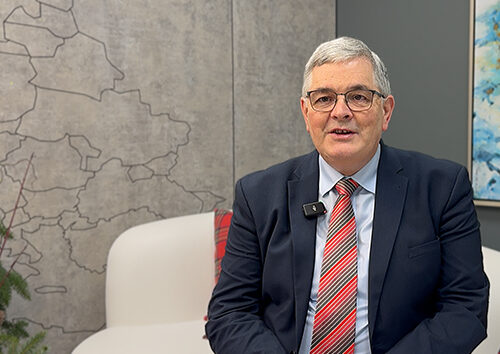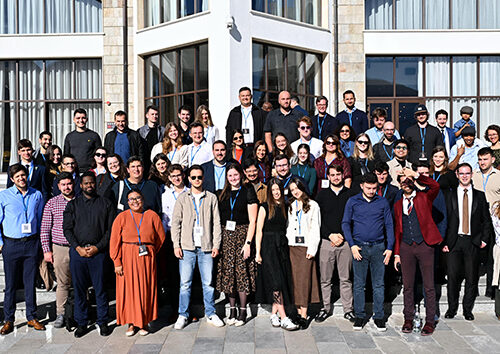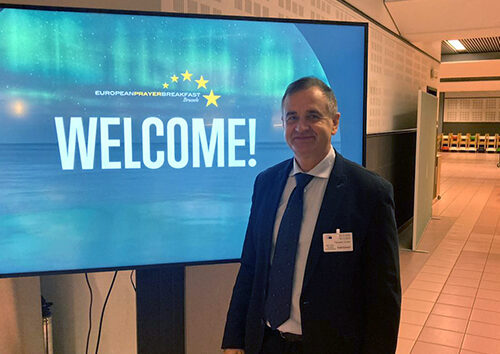18 March 2020 | Binfield, UK [Helen Pearson]
The challenge of creating a community where diversity is respected is ongoing at the local, national and international level. David Putt, from the Jealott’s Hill Community Landshare, virtually next door to Newbold College, offered his insights into the process in the college’s March Diversity lecture: ‘A diverse community supporting a diverse environment’.
![Newbold Principal John Baildam and David Putt, the Jealotts Hill Community Landshare manager. [Photo credits: Asun Olivan] John Baildam and David Putt](https://ted.adventist.org/sitenews/wp-content/uploads/2020/03/images_news-2020_John_Baildam_and_David_Putt.jpg) “There has never been a Diversity Lecture which focused more or better on the business of diversity in community – and it’s all happening virtually next door to the College,” reflected Newbold Principal, John Baildam. He has been actively involved with the Jealott’s Hill project for several years.
“There has never been a Diversity Lecture which focused more or better on the business of diversity in community – and it’s all happening virtually next door to the College,” reflected Newbold Principal, John Baildam. He has been actively involved with the Jealott’s Hill project for several years.
Putt is Project Manager for this unique community of about six acres, five miles (8 km) distant from Newbold College. “We use the power of gardening to positively change the lives of people, to share produce and the joy of practical horticulture,” he said. He gave an account of the variety of work done on the site by a varied mixture of people who support each other on horticultural activities.
That description seems like an understatement. That varied mixture includes nursery school children, people with mental health problems or learning difficulties, members of various charities, and the Women’s Institute. There are young people working for their Duke of Edinburgh’s awards, Gurkha families, Scouts, Brownies, homeless people, young offenders on reparation schemes…and to complete the diversity, Newbold students!
Putt mentioned each group casually as if managing such an extraordinary variety of people on what he described as ‘very small budgets’ was the easiest and most natural thing in the world!
 Community groups work at different times in a variety of horticultural contexts: growing fruit, vegetables and shrubs, developing an orchard, a vineyard or a sensory garden. Wildflowers, butterflies, insects, moths and birds are cared for and logged, together with other wildlife. Alongside these are various associated activities: beekeeping, and a craft and carpentry workshop where bug and bat hotels are built. In the kitchen, cooking and preserving skills are taught using community produce. Other training and workshops for a variety of different groups are run for and by the community. Corporate groups sponsor the activities and participate recognising that the Jealotts Hill Community has a lot to teach them about team-building.
Community groups work at different times in a variety of horticultural contexts: growing fruit, vegetables and shrubs, developing an orchard, a vineyard or a sensory garden. Wildflowers, butterflies, insects, moths and birds are cared for and logged, together with other wildlife. Alongside these are various associated activities: beekeeping, and a craft and carpentry workshop where bug and bat hotels are built. In the kitchen, cooking and preserving skills are taught using community produce. Other training and workshops for a variety of different groups are run for and by the community. Corporate groups sponsor the activities and participate recognising that the Jealotts Hill Community has a lot to teach them about team-building.
So, who runs this diverse community? There is a small group of paid support staff, but volunteers are crucial. Last year, volunteers donated over 25,000 hours of work. “It is the equivalent,” said Putt, “of twelve persons working full time per annum.” Volunteers again are diverse. They come from all age groups and are accepted regardless of disability.
 Not surprisingly, the community has won awards and recognition at both national and local level. In 2013 they were delighted to receive the Queen’s Award for Voluntary Service – the highest award in the voluntary sector. The Pride of Bracknell Forest Awards followed.
Not surprisingly, the community has won awards and recognition at both national and local level. In 2013 they were delighted to receive the Queen’s Award for Voluntary Service – the highest award in the voluntary sector. The Pride of Bracknell Forest Awards followed.
The Q&A explored the ethics of one of the corporate sponsors of the community – Syngenta – whose products are genetically modified. Some people in the audience had qualms about this. Putt’s view was that there was a need to create a balance between genetically modified foods and the needs of hungry people.
Student and staff members of the audience who had worked at Jealotts Hill were clearly keen to hear Putt speak. They had obviously learned a lot from being there. One described the community as ‘a place where no-one says, “I am the boss”’. One of his colleagues described Putt as being a “past master at managing people without the sense of being stressed or pushed – an amazing gift.”
 Putt himself, however, was clear about two things: first, his own secret of building community and reducing conflicts on site. “It’s not ‘my’ project,” he said. “I listen carefully to what people want.” He was also clear about the personal benefits from his work in community building. “I enjoy working with the diversity of people – I’m a richer person from interacting with all those diverse people… I’m impressed by persons with disability who accept their lifestyle in a very mature and proper way… and by hearing former offenders admit things they have done wrong. We all benefit from the richness of people from all sorts of backgrounds – the world would be a very boring place without that.”
Putt himself, however, was clear about two things: first, his own secret of building community and reducing conflicts on site. “It’s not ‘my’ project,” he said. “I listen carefully to what people want.” He was also clear about the personal benefits from his work in community building. “I enjoy working with the diversity of people – I’m a richer person from interacting with all those diverse people… I’m impressed by persons with disability who accept their lifestyle in a very mature and proper way… and by hearing former offenders admit things they have done wrong. We all benefit from the richness of people from all sorts of backgrounds – the world would be a very boring place without that.”
The video of the lecture can be seen on the Newbold College of Higher Education Facebook page.
tedNEWS Staff: Victor Hulbert, editor; Deana Stojković, associate editor
119 St Peter’s Street, St Albans, Herts, AL1 3EY, England
E-mail: [email protected]
Website: www.ted.adventist.org
tedNEWS is an information bulletin issued by the communication department of the Seventh-day Adventist Church in the Trans-European Division. Readers are free to republish or share this article with appropriate credit including an active hyperlink to the original article.



